1 minute ago
- Copy link
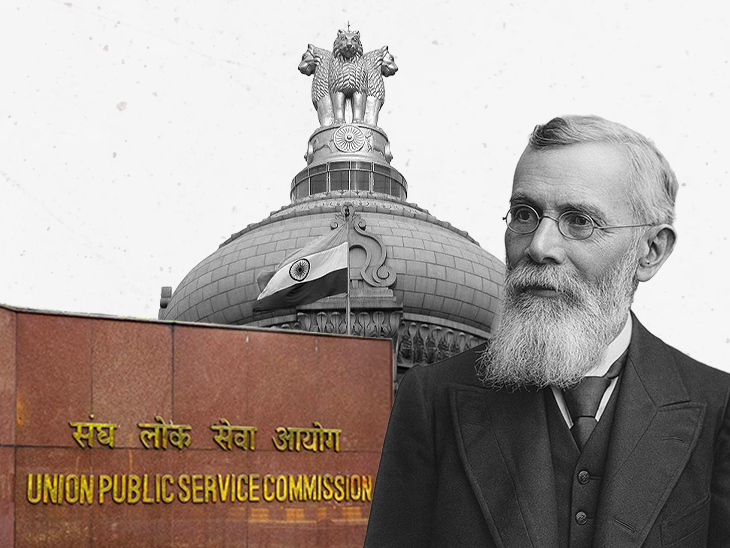
It is a matter of the year 1854, the rule of the East India Company was applicable on India. Selected people of the company were appointed in all administrative positions of power. In such a situation, a committee of Governor General Dalhousie and Lord McCale submitted a recommendation that administrative recruitments should be on the basis of merit based examination.
On this basis, in the year 1855, the Imperial Civil Service i.e. ICS Recruitment Exam started. In 1855, the ICS exam was held in London for the first time. However, not a single Indian was involved in it.
Until the next 8 years i.e. 1962, no Indian could clear this exam. Historians show 4 reasons for this-
- The exam was conducted only in London.
- Bombay or Calcutta had to travel for 4 months and go to London.
- The candidate had to bear the expenses of living and eating in London itself.
- There were also subjects like Latin and Greek in the examination, which were not taught in India.
Despite this, Satyendra Nath Tagore became the first Indian to pass the ICS exam in 1863. When he returned after clearing the exam, he received a grand welcome in Calcutta. He received the Bombay Presidency cadre and retired after service for more than 30 years.
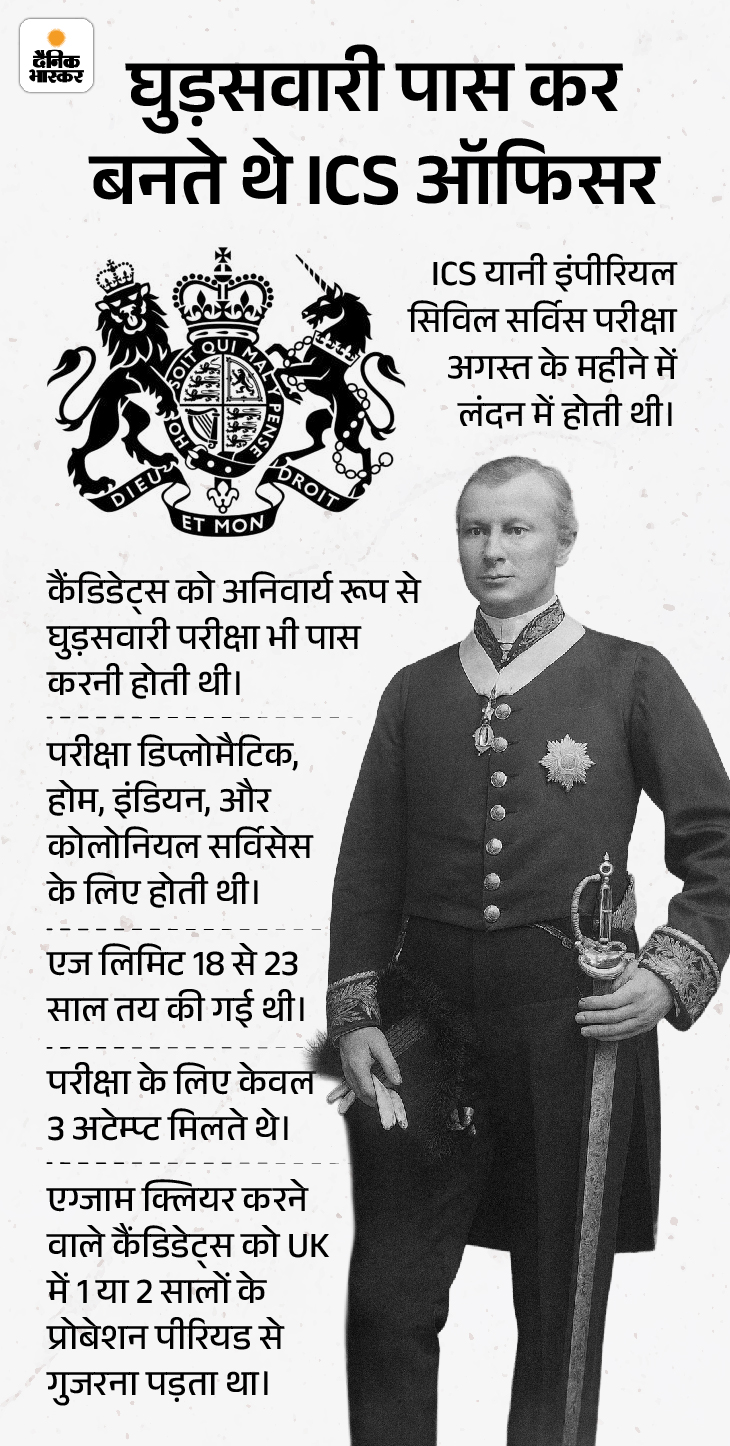
During the probation, candidates studied at Oxford University, Cambridge University, University of London colleges or Trinity College, Dublin. There he studied laws and institutions in India including Criminal Law and Law of Evidence. At the same time, he used to read Indian history and learn the language of the province where he was appointed.
British Crown set uniform
After the Gadar of 1857, the British Crown took into its hands by the hands of the company of India. At the same time, Rani Victoria suggested that there should be an official uniform for civil servants in India. However, the Council of India described it as unnecessary expenses.
The initial uniforms of civil servants include blue coat with gold embroidery, black velvet lining, collar and blue cloth trousers with cuffs, gold and two inch wide laces, beaver cocored hats with black silk cocads and pubic wings, and a sword.
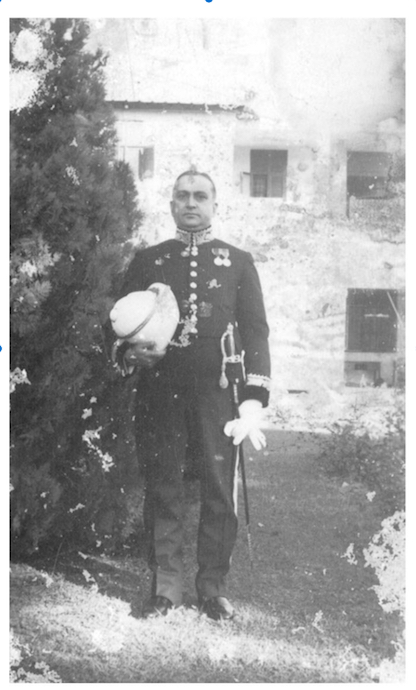
ICS Officer V. Narhari Rao in Civil Services Uniform.
The Governor’s Post of the British province was the highest post for an official of the Imperial Civil Services (ICS). The governors at the top used to get 6,000 pounds along with allowance. The initial salary of the Assistant Commissioner was 300 pounds.
All ICS officers were retired on pension equal to 1,000 pounds. Widows of officers also had the right to get 300 pounds. For this reason, a saying became prevalent that the price of marriage from ICS is ‘alive or dead, annual 300 pounds’.
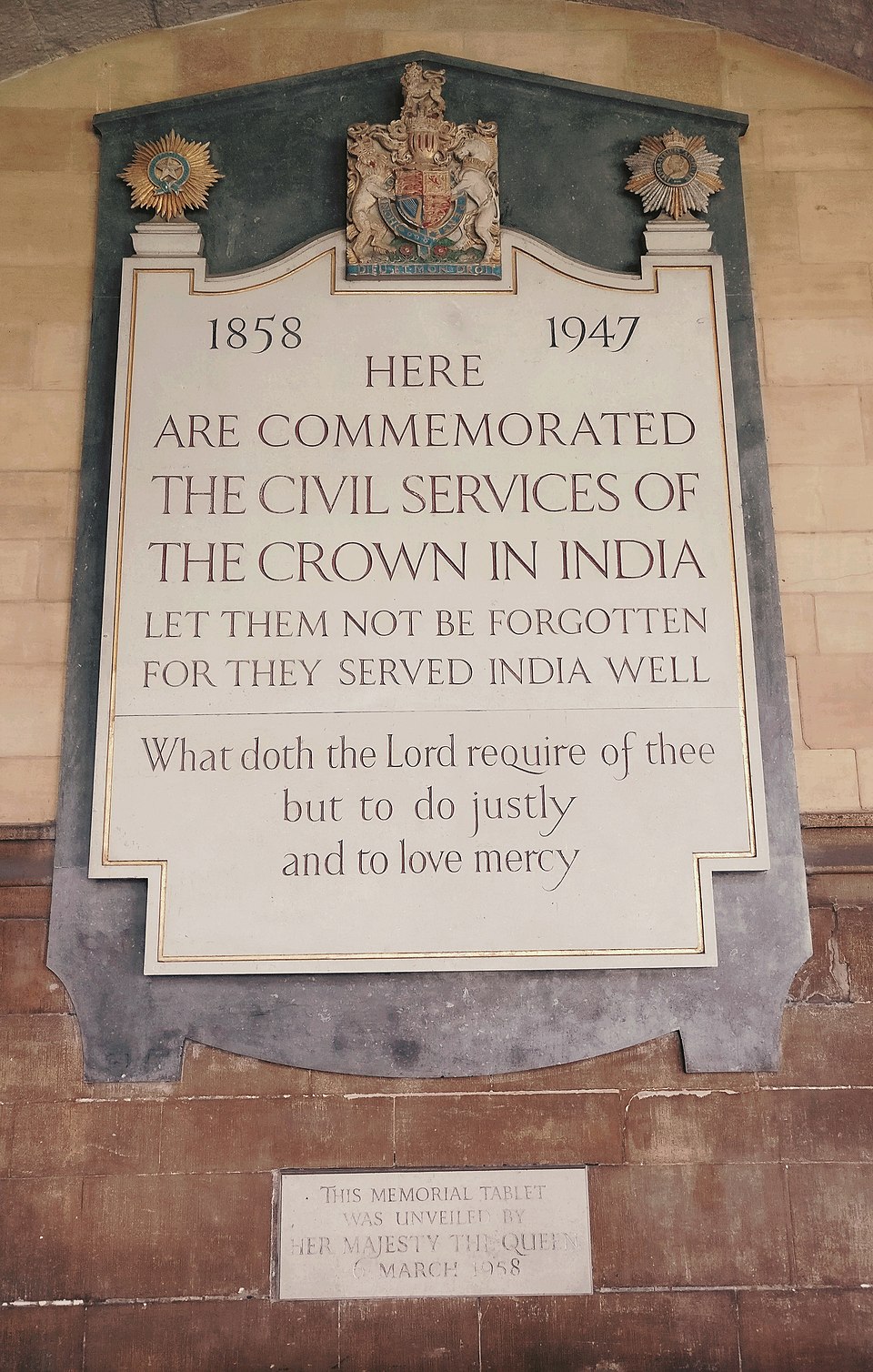
Memorial of Imperial Civil Services located in Westminster Abbey, London.
63 Indians passed ICS in 60 years
For a long time, most of the British were selected in the ICS. By 1871, only 4 Indians were able to join the civil service. After 60 years, ie 1915, only 63 Indians had joined ICS.
In such a situation, there was a change in the selection process of ICS in India. Dadabhai Naoroji and other leaders of the Indian National Congress started demanding that the exam be in India too. Finally, in 1919, the then Secretary of the State for India ‘Edwin Montague’ and Viceroy ‘Lord Chelmsford’ introduced reforms about civil services.
Imperial Civil Services divided into two parts
The Government of India Act, 1919 was passed due to reforms given by Montegue-Chemsford. The Imperial Services, which came into force in 1921, was divided into two parts-
- All India Services
- Central Services
After this, a version of the exam was also started in India. For the first time in 1922, ICS exam took place in Lucknow, Allahabad (now Prayagraj) and Delhi.
‘Lee Commission’ recommended to create a public service commission
In 1923, the demand for independence in India started increasing. In such a situation, the British government appointed a Royal Commission on ICS. The commission was led by ‘Lord Lee’ and was known as ‘Lee Commission’.
In 1924, ‘Lee Commission’ submitted its report, recommending the establishment of Public Service Commission i.e. Public Service Commission. Due to the recommendations, the first Public Service Commission i.e. Public Service Commission was established on 1 October 1926 under the chairmanship of Sir Ross Barker.
Initially, this commission was assigned only limited advisory tasks. The leaders of the freedom movement were dissatisfied with this. In this, he did not see enough efforts to increase the participation of Indians in Indian rule.
Federal Public Service Commission established in 1935
The Government of India Act, 1935 was brought to the Government of India Act, 1935 due to the recommendations of Simon Commission of 1930 and 3 Round Table Conferences between 1930 and 1932.
The act emphasized the requirement of independent body for appointment, transfer and disciplinary matters in civil services, so that the recruitment process is fair and transparent.
For this, Federal Public Service Commission and Provincial Public Service Commission were established in the country this year.
ICS was also divided before independence
According to a report by Hindustan Times, the Imperial Civil Service (ICS) was divided between India and Pakistan Dominion, at the time of India’s Partition and British. The part of India received the Indian Administrative Service (IAS), while the part of Pakistan is called Civil Service of Pakistan (CSP).
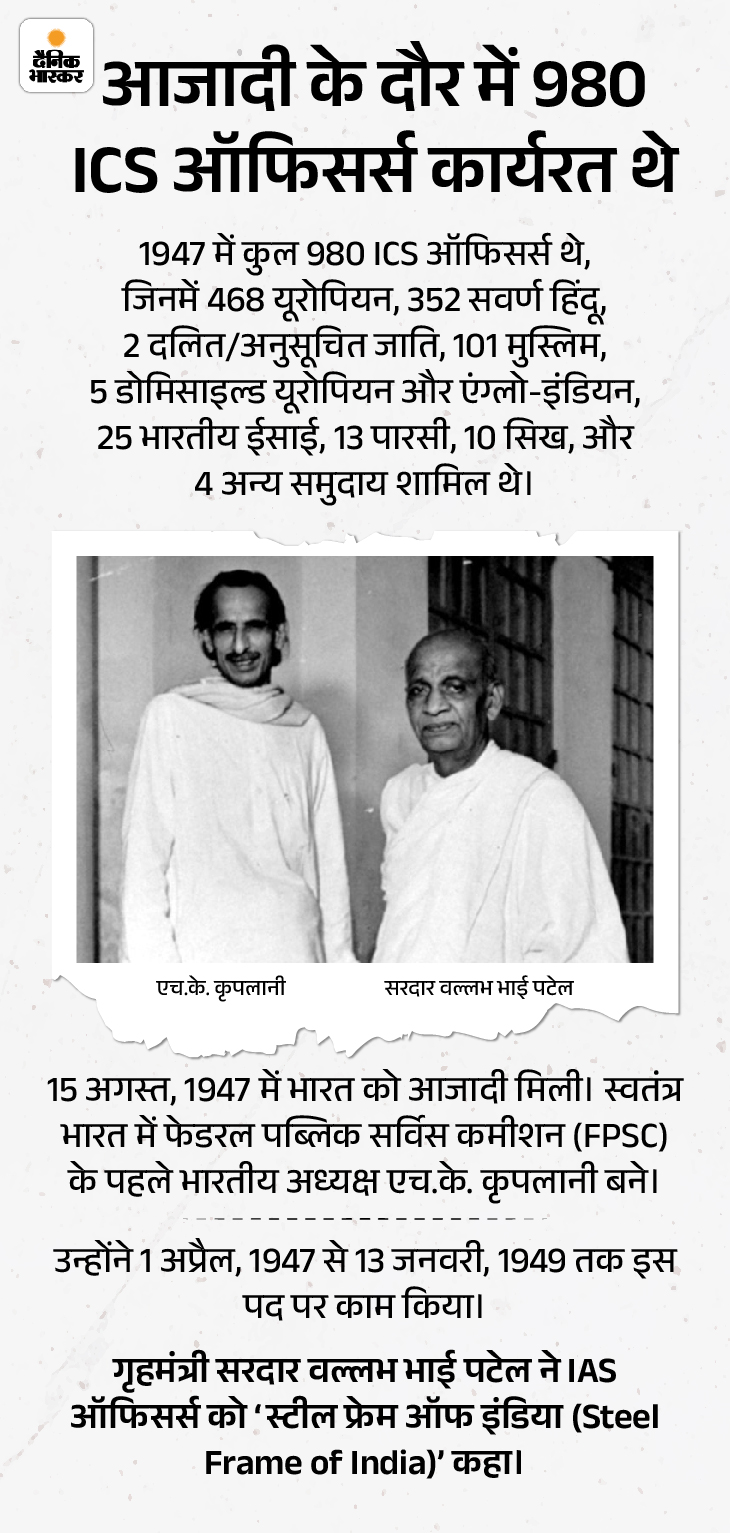
FPSC was reorganized as UPSC
The Constitution of India came into force on 26 January 1950. Along with this, the Federal Public Service Commission (FPSC) was formally reorganized as Union Public Service Commission (Union Public Service Commission (UPSC).
UPSC was established under Article 315 of the Constitution. It was established as an independent body, which will be appointed by the president and members by the President.
UPSC was entrusted with the responsibility of recruitment to All India Services (IAS, IPS, IFS) and other Central Services, which became the basis of the administration of independent India.

Members are appointed by the President of India
The UPSC board consists of a chairman ie Chairman and a maximum of 10 other members. They are appointed by the President of India.
- Its board should have half the members who have worked in a civil service under the Government of India or any State Government for at least 10 years.
- The rest of the members may be experts from areas like education, law, science and administration etc.
- The Department of Personnel and Training (DOPT) under the Ministry of Personnel, Public Grievance and Pension identifies the candidates through a high-level committee or advisory panel.
The president of UPSC is appointed under Article 316 (1) of the Constitution of India. Most UPSC presidents are retired officers of 10 years experience Indian Administrative Services (IAS), Indian Police Services (IPS) or other All India Services. The current president of UPSC, Dr. Ajay Kumar, is a 1985 batch IAS officer and has been a defense secretary.
Read this news too …
Approval of impeachment motion against Justice Yashwant Verma: BCom from Delhi, MP to LLB; In the legal profession for 33 years; Learn the full profile
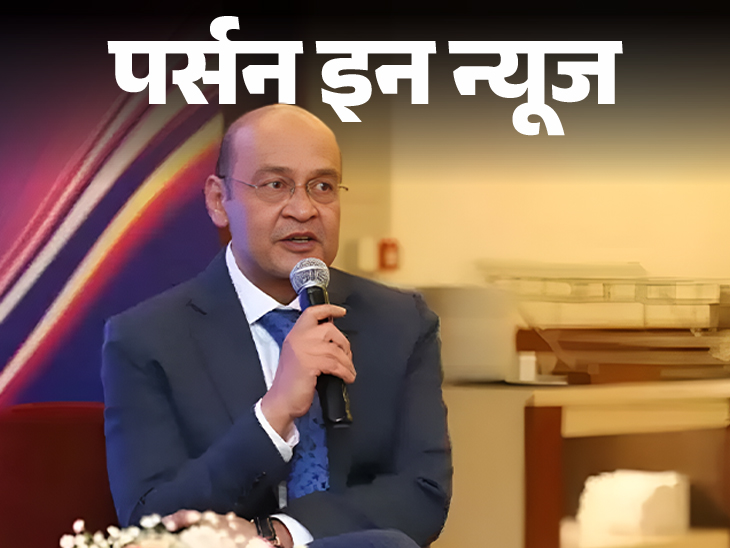
The impeachment motion against Justice Yashwant Verma was approved on Tuesday, August 12 in the Lok Sabha in the cash scandal case. Speaker Om Birla said, “I have received a proposal with a total signature of 146 members, including Ravi Shankar Prasad and the Leader of the Opposition.”
In fact, on March 14, while being a judge of the Delhi High Court, Justice Yashwant Verma’s house was allegedly received in large quantities. The committee of 3 judges found the allegations to be correct and convicted them to investigate the case. Due to this, on May 8, CJI had written a letter to the Prime Minister and the President recommended the impeachment motion. Read full news …
 Recruitment Syllabus
Recruitment Syllabus
